- Home
- P. G. Wodehouse
The Golf Omnibus Page 4
The Golf Omnibus Read online
Page 4
“Nonsense! Who wants an English writer to be English? You’ve got to be Russian or Spanish or something to be a real success. The mantle of the great Russians has descended on Mr. Devine.”
“From what I’ve heard of Russians, I should hate to have that happen to me.”
“There is no danger of that,” said Adeline scornfully.
“Oh! Well, let me tell you that there is a lot more in me than you think.”
“That might easily be so.”
“You think I’m not spiritual and intellectual,” said Cuthbert, deeply moved. “Very well. Tomorrow I join the Literary Society.”
Even as he spoke the words his leg was itching to kick himself for being such a chump, but the sudden expression of pleasure on Adeline’s face soothed him; and he went home that night with the feeling that he had taken on something rather attractive. It was only in the cold grey light of the morning that he realized what he had let himself in for.
I do not know if you have had any experience of suburban literary societies, but the one that flourished under the eye of Mrs. Willoughby Smethurst at Wood Hills was rather more so than the average. With my feeble powers of narrative, I cannot hope to make clear to you all that Cuthbert Banks endured in the next few weeks. And, even if I could, I doubt if I should do so. It is all very well to excite pity and terror, as Aristotle recommends, but there are limits. In the ancient Greek tragedies it was an ironclad rule that all the real rough stuff should take place off-stage, and I shall follow this admirable principle. It will suffice if I say merely that J. Cuthbert Banks had a thin time. After attending eleven debates and fourteen lectures on vers libre Poetry, the Seventeenth-Century Essayists, the Neo-Scandinavian Movement in Portuguese Literature, and other subjects of a similar nature, he grew so enfeebled that, on the rare occasions when he had time for a visit to the links, he had to take a full iron for his mashie shots.
It was not simply the oppressive nature of the debates and lectures that sapped his vitality. What really got right in amongst him was the torture of seeing Adeline’s adoration of Raymond Parsloe Devine. The man seemed to have made the deepest possible impression upon her plastic emotions. When he spoke, she leaned forward with parted lips and looked at him. When he was not speaking—which was seldom—she leaned back and looked at him. And when he happened to take the next seat to her, she leaned sideways and looked at him. One glance at Mr. Devine would have been more than enough for Cuthbert; but Adeline found him a spectacle that never palled. She could not have gazed at him with a more rapturous intensity if she had been a small child and he a saucer of ice-cream. All this Cuthbert had to witness while still endeavouring to retain the possession of his faculties sufficiently to enable him to duck and back away if somebody suddenly asked him what he thought of the sombre realism of Vladimir Brusiloff. It is little wonder that he tossed in bed, picking at the coverlet, through sleepless nights, and had to have all his waistcoats taken in three inches to keep them from sagging.
This Vladimir Brusiloff to whom I have referred was the famous Russian novelist, and, owing to the fact of his being in the country on a lecturing tour at the moment, there had been something of a boom in his works. The Wood Hills Literary Society had been studying them for weeks, and never since his first entrance into intellectual circles had Cuthbert Banks come nearer to throwing in the towel. Vladimir specialized in grey studies of hopeless misery, where nothing happened till page three hundred and eighty, when the moujik decided to commit suicide. It was tough going for a man whose deepest reading hitherto had been Vardon on the Push-Shot, and there can be no greater proof of the magic of love than the fact that Cuthbert stuck it without a cry. But the strain was terrible and I am inclined to think that he must have cracked, had it not been for the daily reports in the papers of the internecine strife which was proceeding so briskly in Russia. Cuthbert was an optimist at heart, and it seemed to him that, at the rate at which the inhabitants of that interesting country were murdering one another, the supply of Russian novelists must eventually give out.
One morning, as he tottered down the road for the short walk which was now almost the only exercise to which he was equal, Cuthbert met Adeline. A spasm of anguish flitted through all his nerve-centres as he saw that she was accompanied by Raymond Parsloe Devine.
“Good morning, Mr. Banks,” said Adeline.
“Good morning,” said Cuthbert hollowly.
“Such good news about Vladimir Brusiloff.”
“Dead?” said Cuthbert, with a touch of hope.
“Dead? Of course not. Why should he be? No, Aunt Emily met his manager after his lecture at Queen’s Hall yesterday, and he has promised that Mr. Brusiloff shall come to her next Wednesday reception.
“Oh, ah!” said Cuthbert, dully.
“I don’t know how she managed it. I think she must have told him that Mr. Devine would be there to meet him.”
“But you said he was coming,” argued Cuthbert.
“I shall be very glad,” said Raymond Devine, “of the opportunity of meeting Brusiloff.”
“I’m sure,” said Adeline, “he will be very glad of the opportunity of meeting you.”
“Possibly,” said Mr. Devine. “Possibly. Competent critics have said that my work closely resembles that of the great Russian Masters.”
“Your psychology is so deep.”
“Yes, yes.”
“And your atmosphere.”
“Quite.”
Cuthbert in a perfect agony of spirit prepared to withdraw from this love-feast. The sun was shining brightly, but the world was black to him. Birds sang in the tree-tops, but he did not hear them. He might have been a moujik for all the pleasure he found in life.
“You will be there, Mr. Banks?” said Adeline, as he turned away.
“Oh, all right,” said Cuthbert.
When Cuthbert had entered the drawing-room on the following Wednesday and had taken his usual place in a distant corner where, while able to feast his gaze on Adeline, he had a sporting chance of being overlooked or mistaken for a piece of furniture, he perceived the great Russian thinker seated in the midst of a circle of admiring females. Raymond Parsloe Devine had not yet arrived.
His first glance at the novelist surprised Cuthbert. Doubtless with the best motives, Vladimir Brusiloff had permitted his face to become almost entirely concealed behind a dense zareba of hair, but his eyes were visible through the undergrowth, and it seemed to Cuthbert that there was an expression in them not unlike that of a cat in a strange backyard surrounded by small boys. The man looked forlorn and hopeless, and Cuthbert wondered whether he had had bad news from home.
This was not the case. The latest news which Vladimir Brusiloff had had from Russia had been particularly cheering. Three of his principal creditors had perished in the last massacre of the bourgeoisie, and a man whom he owed for five years for a samovar and a pair of overshoes had fled the country, and had not been heard of since. It was not bad news from home that was depressing Vladimir. What was wrong with him was the fact that this was the eighty-second suburban literary reception he had been compelled to attend since he had landed in the country on his lecturing tour, and he was sick to death of it. When his agent had first suggested the trip, he had signed on the dotted line without an instant’s hesitation. Worked out in roubles, the fees offered had seemed just about right. But now, as he peered through the brushwood at the faces round him, and realized that eight out of ten of those present had manuscripts of some sort concealed on their persons, and were only waiting for an opportunity to whip them out and start reading, he wished that he had stayed at his quiet home in Nijni-Novgorod, where the worst thing that could happen to a fellow was a brace of bombs coming in through the window and mixing themselves up with his breakfast egg.
At this point in his meditations he was aware that his hostess was looming up before him with a pale young man in horn-rimmed spectacles at her side. There was in Mrs. Smethurst’s demeanour something of the unction of the master-
of-ceremonies at the big fight who introduces the earnest gentleman who wishes to challenge the winner.
“Oh, Mr. Brusiloff,” said Mrs. Smethurst, “I do so want you to meet Mr. Raymond Parsloe Devine, whose work I expect you know. He is one of our younger novelists.”
The distinguished visitor peered in a wary and defensive manner through the shrubbery, but did not speak. Inwardly he was thinking how exactly like Mr. Devine was to the eighty-one other younger novelists to whom he had been introduced at various hamlets throughout the country. Raymond Parsloe Devine bowed courteously, while Cuthbert, wedged into his corner, glowered at him.
“The critics,” said Mr. Devine, “have been kind enough to say that my poor efforts contain a good deal of the Russian spirit. I owe much to the great Russians. I have been greatly influenced by Sovietski.”
Down in the forest something stirred. It was Vladimir Brusiloff’s mouth opening, as he prepared to speak. He was not a man who prattled readily, especially in a foreign tongue. He gave the impression that each word was excavated from his interior by some up-to-date process of mining. He glared bleakly at Mr. Devine, and allowed three words to drop out of him.
“Sovietski no good!”
He paused for a moment, set the machinery working again, and delivered five more at the pithead.
“I spit me of Sovietski!”
There was a painful sensation. The lot of a popular idol is in many ways an enviable one, but it has the drawback of uncertainty. Here today and gone tomorrow. Until this moment Raymond Parsloe Devine’s stock had stood at something considerably over par in Wood Hills intellectual circles, but now there was a rapid slump. Hitherto he had been greatly admired for being influenced by Sovietski, but it appeared now that this was not a good thing to be. It was evidently a rotten thing to be. The law could not touch you for being influenced by Sovietski, but there is an ethical as well as a legal code, and this it was obvious that Raymond Parsloe Devine had transgressed. Women drew away from him slightly, holding their skirts. Men looked at him censoriously. Adeline Smethurst started violently, and dropped a tea-cup. And Cuthbert Banks, doing his popular imitation of a sardine in his corner, felt for the first time that life held something of sunshine.
Raymond Parsloe Devine was plainly shaken, but he made an adroit attempt to recover his lost prestige.
“When I say I have been influenced by Sovietski, I mean, of course, that I was once under his spell. A young writer commits many follies. I have long since passed through that phase. The false glamour of Sovietski has ceased to dazzle me. I now belong whole-heartedly to the school of Nastikoff.”
There was a reaction. People nodded at one another sympathetically. After all, we cannot expect old heads on young shoulders, and a lapse at the outset of one’s career should not be held against one who has eventually seen the light.
“Nastikoff no good,” said Vladimir Brusiloff, coldly. He paused, listening to the machinery.
“Nastikoff worse than Sovietski.”
He paused again.
“I spit me of Nastikoff!” he said.
This time there was no doubt about it. The bottom had dropped out of the market, and Raymond Parsloe Devine Preferred were down in the cellar with no takers. It was clear to the entire assembled company that they had been all wrong about Raymond Parsloe Devine. They had allowed him to play on their innocence and sell them a pup. They had taken him at his own valuation, and had been cheated into admiring him as a man who amounted to something, and all the while he had belonged to the school of Nastikoff. You never can tell. Mrs. Smethurst’s guests were well-bred, and there was consequently no violent demonstration, but you could see by their faces what they felt. Those nearest Raymond Parsloe jostled to get further away. Mrs. Smethurst eyed him stonily through a raised lorgnette. One or two low hisses were heard, and over at the other end of the room somebody opened the window in a marked manner.
Raymond Parsloe Devine hesitated for a moment, then, realizing his situation, turned and slunk to the door. There was an audible sigh of relief as it closed behind him.
Vladimir Brusiloff proceeded to sum up.
“No novelists any good except me. Sovietski—yah! Nastikoff—bah! I spit me of zem all. No novelists anywhere any good except me. P. G. Wodehouse and Tolstoi not bad. Not good, but not bad. No novelists any good except me.”
And, having uttered this dictum, he removed a slab of cake from a near-by plate, steered it through the jungle, and began to champ.
It is too much to say that there was a dead silence. There could never be that in any room in which Vladimir Brusiloff was eating cake. But certainly what you might call the general chit-chat was pretty well down and out. Nobody liked to be the first to speak. The members of the Wood Hills Literary Society looked at one another timidly. Cuthbert, for his part, gazed at Adeline; and Adeline gazed into space. It was plain that the girl was deeply stirred. Her eyes were opened wide, a faint flush crimsoned her cheeks, and her breath was coming quickly.
Adeline’s mind was in a whirl. She felt as if she had been walking gaily along a pleasant path and had stopped suddenly on the very brink of a precipice. It would be idle to deny that Raymond Parsloe Devine had attracted her extraordinarily. She had taken him at his own valuation as an extremely hot potato, and her hero-worship had gradually been turning into love. And now her hero had been shown to have feet of clay. It was hard, I consider, on Raymond Parsloe Devine, but that is how it goes in this world. You get a following as a celebrity, and then you run up against another bigger celebrity and your admirers desert you. One could moralize on this at considerable length, but better not, perhaps. Enough to say that the glamour of Raymond Devine ceased abruptly in that moment for Adeline, and her most coherent thought at this juncture was the resolve, as soon as she got up to her room, to burn the three signed photographs he had sent her and to give the autographed presentation set of his books to the grocer’s boy.
Mrs. Smethurst, meanwhile, having rallied somewhat, was endeavouring to set the feast of reason and flow of soul going again.
“And how do you like England, Mr. Brusiloff?” she asked.
The celebrity paused in the act of lowering another segment of cake.
“Dam good,” he replied, cordially.
“I suppose you have travelled all over the country by this time?”
“You said it,” agreed the Thinker.
“Have you met many of our great public men?”
“Yais—Yais—Quite a few of the nibs—Lloyid Gorge, I meet him. But—” Beneath the matting a discontented expression came into his face, and his voice took on a peevish note. “But I not meet your real great men—your Arbmishel, your Arreevadon—I not meet them. That’s what gives me the pipovitch. Have you ever met Arbmishel and Arreevadon?”
A strained, anguished look came into Mrs. Smethurst’s face and was reflected in the faces of the other members of the circle. The eminent Russian had sprung two entirely new ones on them, and they felt that their ignorance was about to be exposed. What would Vladimir Brusiloff think of the Wood Hills Literary Society? The reputation of the Wood Hills Literary Society was at stake, trembling in the balance, and coming up for the third time. In dumb agony Mrs. Smethurst rolled he eyes about the room searching for someone capable of coming to the rescue. She drew blank.
And then, from a distant corner, there sounded a deprecating cough, and those nearest Cuthbert Banks saw that he had stopped twisting his right foot round his left ankle and his left foot round his right ankle and was sitting up with a light of almost human intelligence in his eyes.
“Er—” said Cuthbert, blushing as every eye in the room seemed to fix itself on him, “I think he means Abe Mitchell and Harry Vardon.”
“Abe Mitchell and Harry Vardon?” repeated Mrs. Smethurst, blankly. “I never heard of—”
“Yais! Yais! Most! Very!” shouted Vladimir Brusiloff, enthusiastically. “Arbmishel and Arreevadon. You know them, yes, what, no, perhaps?”
“I�
��ve played with Abe Mitchell often, and I was partnered with Harry Vardon in last year’s Open.”
The great Russian uttered a cry that shook the chandelier.
“You play in ze Open? Why,” he demanded reproachfully of Mrs. Smethurst, “was I not been introducted to this young man who play in opens?”
“Well, really,” faltered Mrs. Smethurst. “Well, the fact is, Mr. Brusiloff⎯”
She broke off. She was unequal to the task of explaining, without hurting anyone’s feelings, that she had always regarded Cuthbert as a piece of cheese and a blot on the landscape.
“Introduct me!” thundered the Celebrity.
“Why, certainly, certainly, of course. This is Mr.⎯.” She looked appealingly at Cuthbert.
“Banks,” prompted Cuthbert.
“Banks!” cried Vladimir Brusiloff. “Not Cootaboot Banks?”
“Is your name Cootaboot?” asked Mrs. Smethurst, faintly.
“Well, it’s Cuthbert.”
“Yais! Yais! Cootaboot!” There was a rush and swirl, as the effervescent Muscovite burst his way through the throng and rushed to where Cuthbert sat. He stood for a moment eyeing him excitedly, then, stooping swiftly, kissed him on both cheeks before Cuthbert could get his guard up. “My dear young man, I saw you win ze French Open. Great! Great! Grand! Superb! Hot stuff, and you can say I said so! Will you permit one who is but eighteen at Nijni-Novgorod to salute you once more?”
And he kissed Cuthbert again. Then, brushing aside one or two intellectuals who were in the way, he dragged up a chair and sat down.
“You are a great man!” he said.
“Oh, no,” said Cuthbert modestly.
“Yais! Great. Most! Very! The way you lay your approach-putts dead from anywhere!”
“Oh, I don’t know.”
Mr. Brusiloff drew his chair closer.
“Let me tell you one vairy funny story about putting. It was one day I play at Nijni-Novgorod with the pro. against Lenin and Trotsky, and Trotsky had a two-inch putt for the hole. But, just as he addresses the ball, someone in the crowd he tries to assassinate Lenin with a rewolwer—you know that is our great national sport, trying to assassinate Lenin with rewolwers—and the bang puts Trotsky off his stroke and he goes five yards past the hole, and then Lenin, who is rather shaken, you understand, he misses again himself, and we win the hole and match and I clean up three hundred and ninety-six thousand roubles, or fifteen shillings in your money. Some gameovitch! And now let me tell you one other vairy funny story⎯”

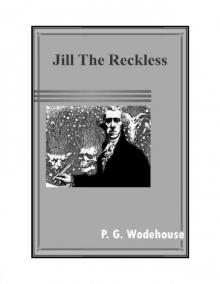 Jill the Reckless
Jill the Reckless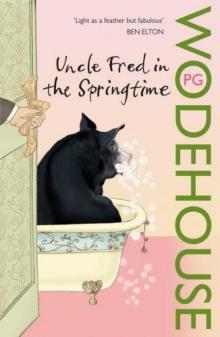 Uncle Fred in the Springtime
Uncle Fred in the Springtime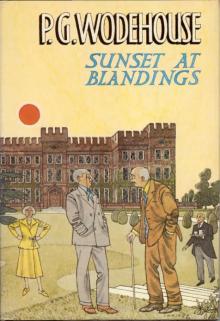 Sunset at Blandings
Sunset at Blandings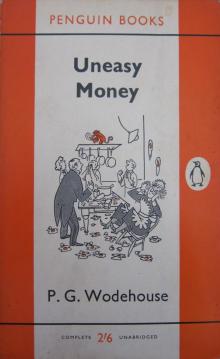 Uneasy Money
Uneasy Money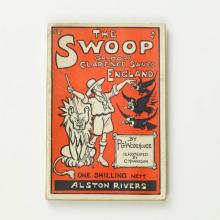 The Swoop! or, How Clarence Saved England: A Tale of the Great Invasion
The Swoop! or, How Clarence Saved England: A Tale of the Great Invasion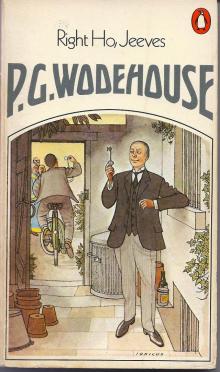 Right Ho, Jeeves
Right Ho, Jeeves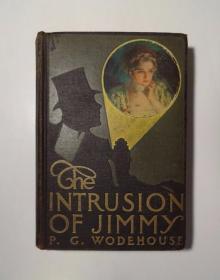 The Intrusion of Jimmy
The Intrusion of Jimmy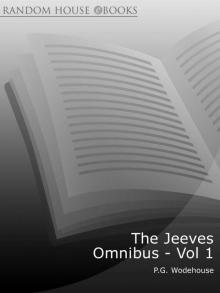 The Jeeves Omnibus - Vol 1:
The Jeeves Omnibus - Vol 1: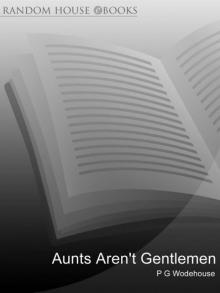 Aunts Aren't Gentlemen:
Aunts Aren't Gentlemen: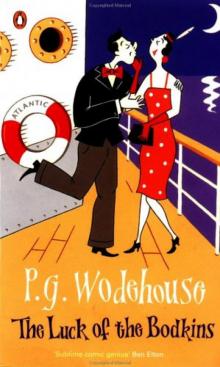 The Luck of the Bodkins
The Luck of the Bodkins The Little Nugget
The Little Nugget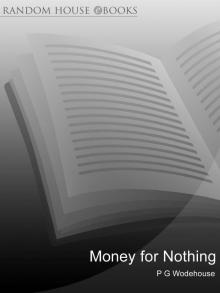 Money for Nothing
Money for Nothing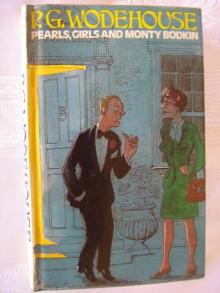 Pearls, Girls and Monty Bodkin
Pearls, Girls and Monty Bodkin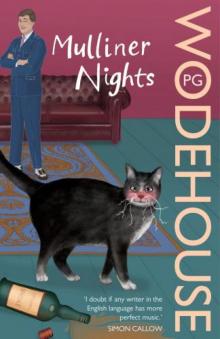 Mulliner Nights
Mulliner Nights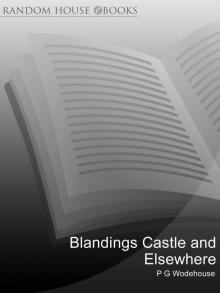 Blandings Castle and Elsewhere
Blandings Castle and Elsewhere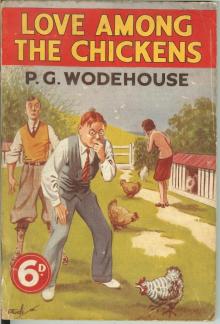 Love Among the Chickens
Love Among the Chickens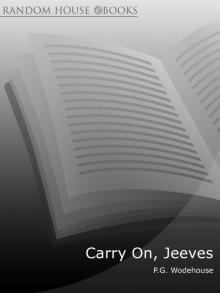 Carry On, Jeeves!
Carry On, Jeeves!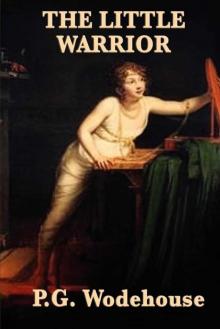 The Little Warrior
The Little Warrior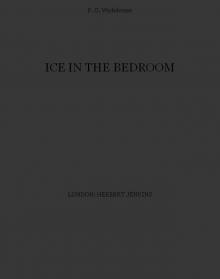 Ice in the Bedroom
Ice in the Bedroom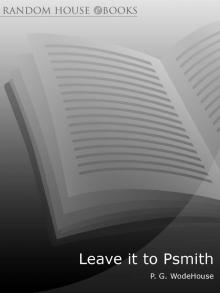 Leave It to Psmith
Leave It to Psmith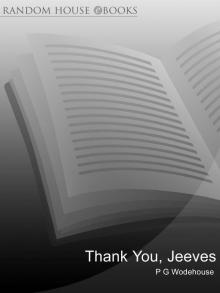 Thank You, Jeeves:
Thank You, Jeeves: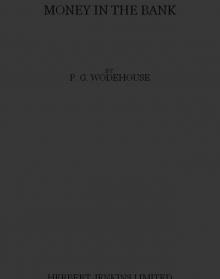 Money in the Bank
Money in the Bank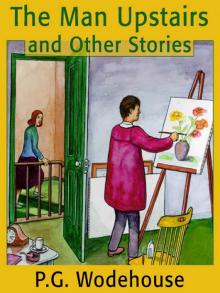 The Man Upstairs and Other Stories
The Man Upstairs and Other Stories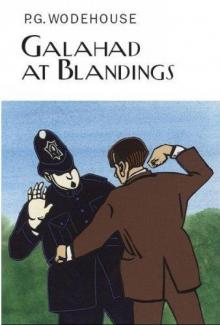 Galahad at Blandings
Galahad at Blandings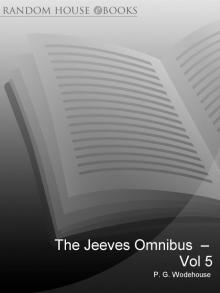 The Jeeves Omnibus Vol. 5
The Jeeves Omnibus Vol. 5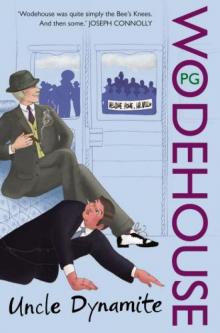 Uncle Dynamite
Uncle Dynamite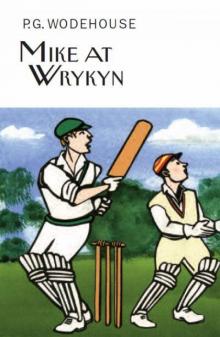 Mike at Wrykyn
Mike at Wrykyn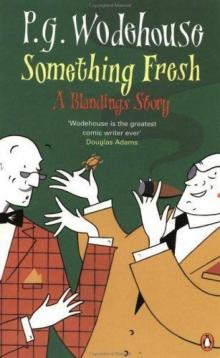 Something Fresh
Something Fresh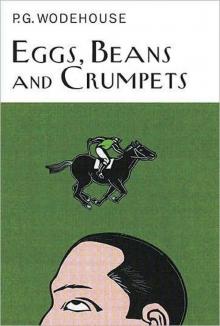 Eggs, Beans and Crumpets
Eggs, Beans and Crumpets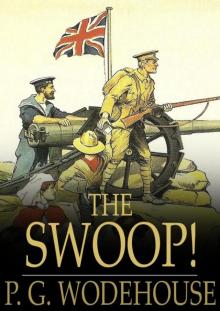 The Swoop: How Clarence Saved England (Forgotten Books)
The Swoop: How Clarence Saved England (Forgotten Books)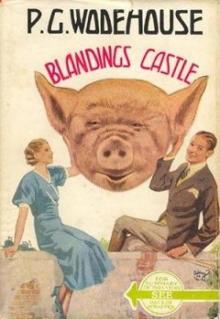 Blanding Castle Omnibus
Blanding Castle Omnibus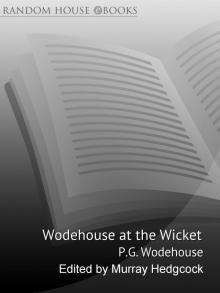 Wodehouse at the Wicket: A Cricketing Anthology
Wodehouse at the Wicket: A Cricketing Anthology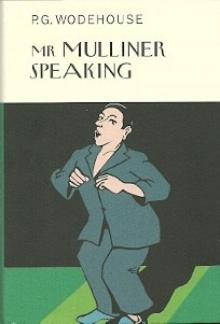 Mr. Mulliner Speaking
Mr. Mulliner Speaking Hot Water
Hot Water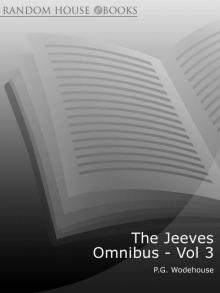 The Jeeves Omnibus - Vol 3: The Mating Season / Ring for Jeeves / Very Good, Jeeves
The Jeeves Omnibus - Vol 3: The Mating Season / Ring for Jeeves / Very Good, Jeeves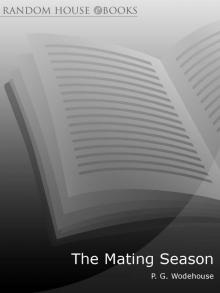 The Mating Season
The Mating Season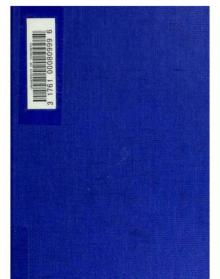 Meet Mr. Mulliner
Meet Mr. Mulliner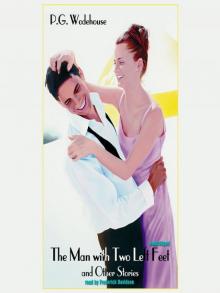 The Man with Two Left Feet, and Other Stories
The Man with Two Left Feet, and Other Stories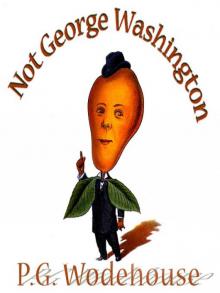 Not George Washington — an Autobiographical Novel
Not George Washington — an Autobiographical Novel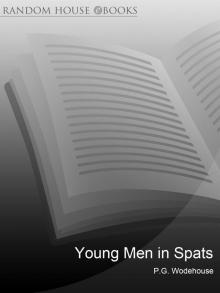 Young Men in Spats
Young Men in Spats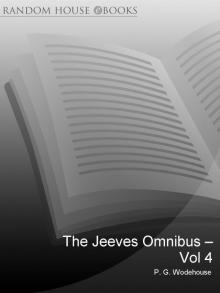 The Jeeves Omnibus Vol. 4
The Jeeves Omnibus Vol. 4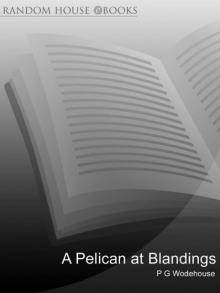 A Pelican at Blandings:
A Pelican at Blandings: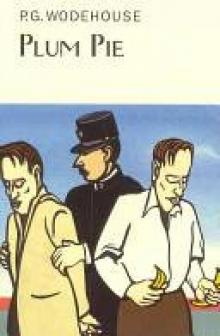 Plum Pie
Plum Pie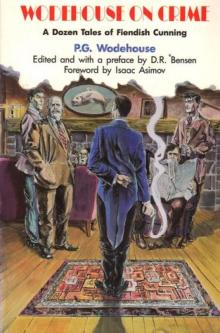 Wodehouse On Crime
Wodehouse On Crime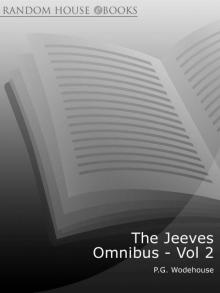 The Jeeves Omnibus Vol. 2: Right Ho, Jeeves / Joy in the Morning / Carry On, Jeeves
The Jeeves Omnibus Vol. 2: Right Ho, Jeeves / Joy in the Morning / Carry On, Jeeves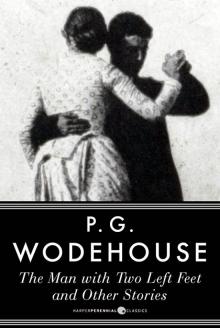 The Man With Two Left Feet
The Man With Two Left Feet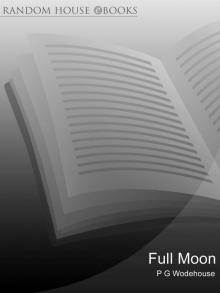 Full Moon:
Full Moon: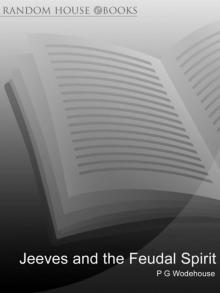 Jeeves and the Feudal Spirit:
Jeeves and the Feudal Spirit: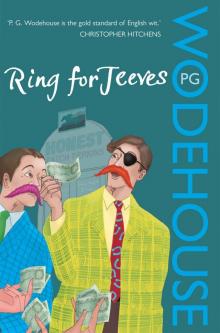 Ring For Jeeves
Ring For Jeeves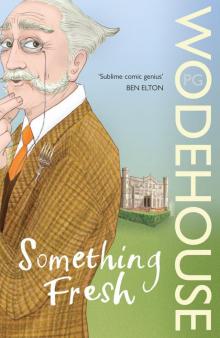 Something New
Something New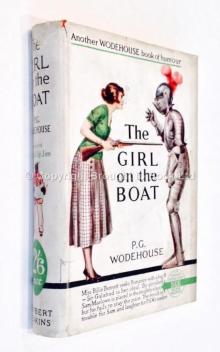 The Girl on the Boat
The Girl on the Boat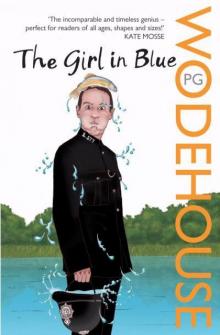 The Girl in Blue
The Girl in Blue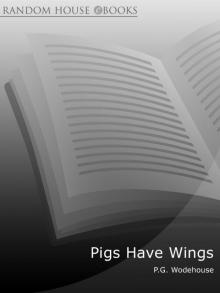 Pigs Have Wings:
Pigs Have Wings: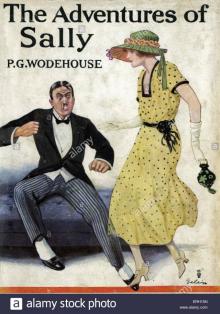 The Adventures of Sally
The Adventures of Sally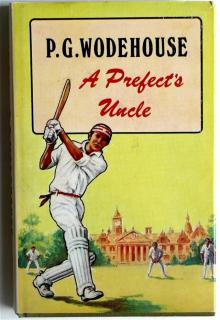 A Prefect's Uncle
A Prefect's Uncle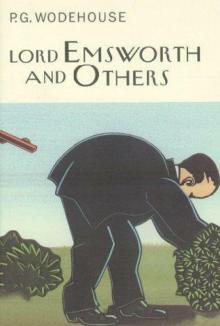 Lord Emsworth and Others
Lord Emsworth and Others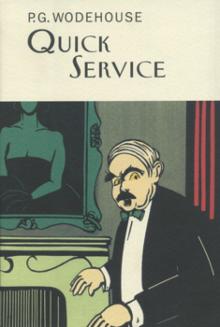 Quick Service
Quick Service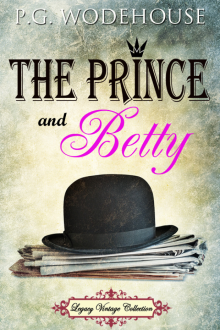 The Prince and Betty
The Prince and Betty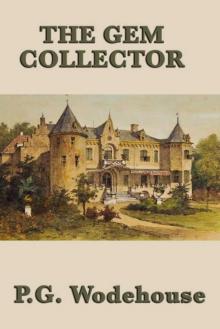 The Gem Collector
The Gem Collector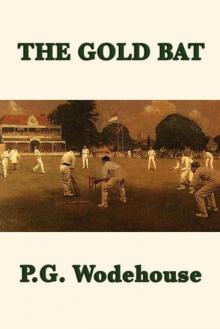 The Gold Bat
The Gold Bat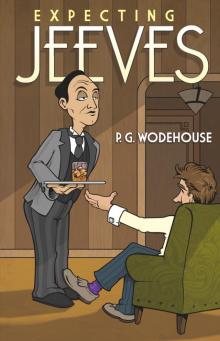 Expecting Jeeves
Expecting Jeeves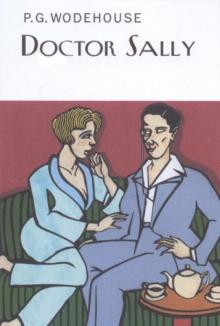 Doctor Sally
Doctor Sally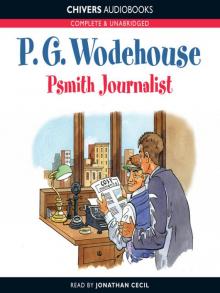 Psmith, Journalist
Psmith, Journalist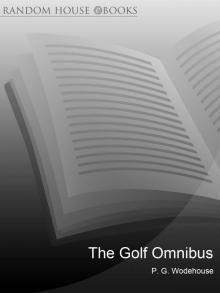 The Golf Omnibus
The Golf Omnibus Heavy Weather
Heavy Weather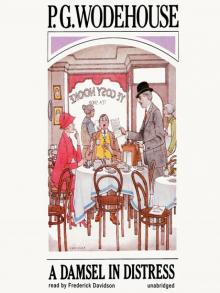 A Damsel in Distress
A Damsel in Distress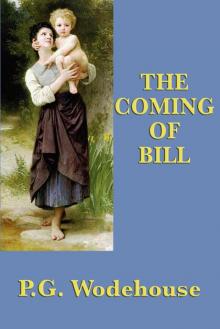 The Coming of Bill
The Coming of Bill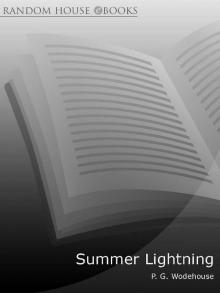 Summer Lightning
Summer Lightning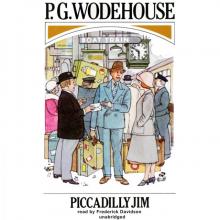 Piccadilly Jim
Piccadilly Jim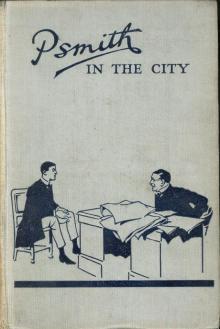 Psmith in the City
Psmith in the City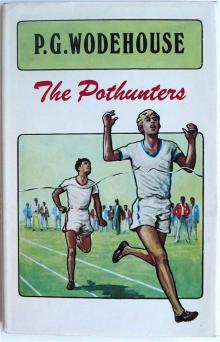 The Pothunters
The Pothunters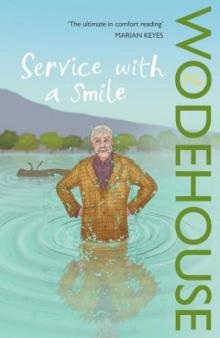 Service With a Smile
Service With a Smile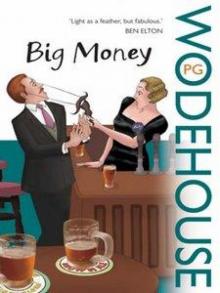 Big Money
Big Money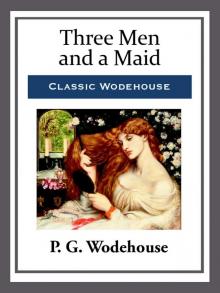 Three Men and a Maid
Three Men and a Maid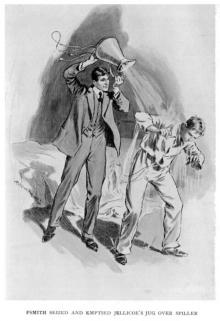 Mike and Psmith
Mike and Psmith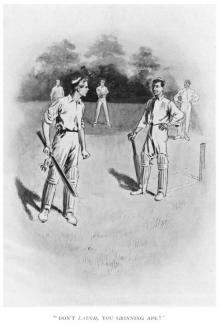 Mike
Mike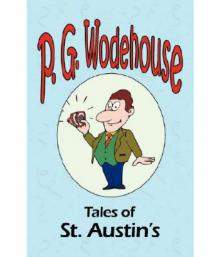 Tales of St. Austin's
Tales of St. Austin's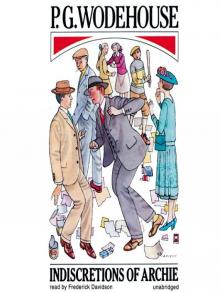 Indiscretions of Archie
Indiscretions of Archie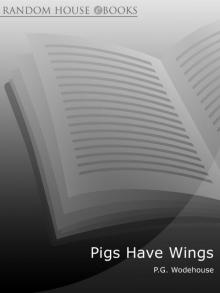 Pigs Have Wings
Pigs Have Wings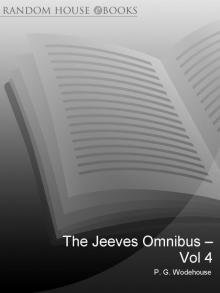 The Jeeves Omnibus - Vol 4: (Jeeves & Wooster): No.4
The Jeeves Omnibus - Vol 4: (Jeeves & Wooster): No.4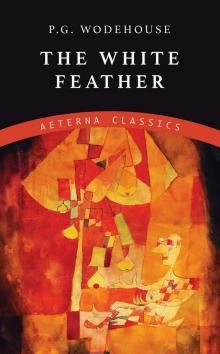 The White Feather
The White Feather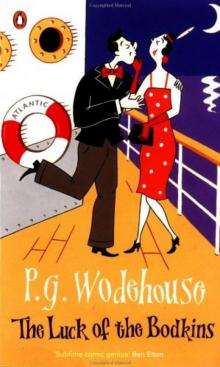 Luck of the Bodkins
Luck of the Bodkins THE SPRING SUIT
THE SPRING SUIT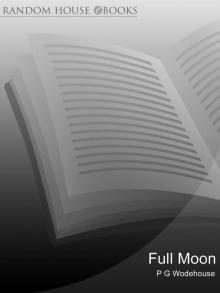 Full Moon
Full Moon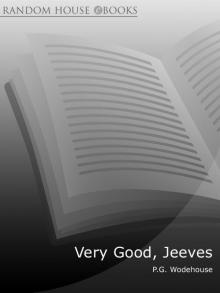 Very Good, Jeeves
Very Good, Jeeves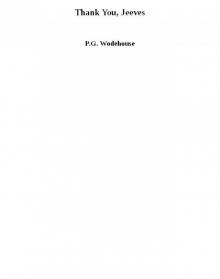 Thank You, Jeeves
Thank You, Jeeves Reginald's Record Knock.
Reginald's Record Knock.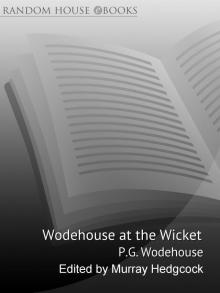 Wodehouse At the Wicket
Wodehouse At the Wicket LADIES AND GENTLEMEN V. PLAYERS
LADIES AND GENTLEMEN V. PLAYERS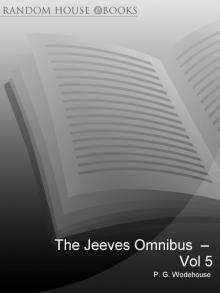 The Jeeves Omnibus - Vol 5: (Jeeves & Wooster)
The Jeeves Omnibus - Vol 5: (Jeeves & Wooster)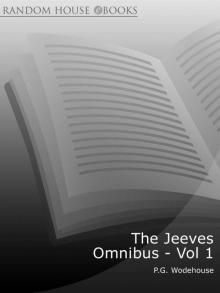 The Jeeves Omnibus - Vol 1: (Jeeves & Wooster): No.1
The Jeeves Omnibus - Vol 1: (Jeeves & Wooster): No.1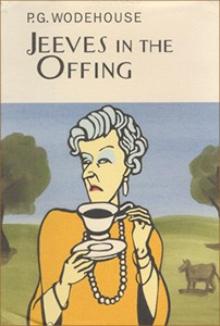 Jeeves in the offing jaw-12
Jeeves in the offing jaw-12